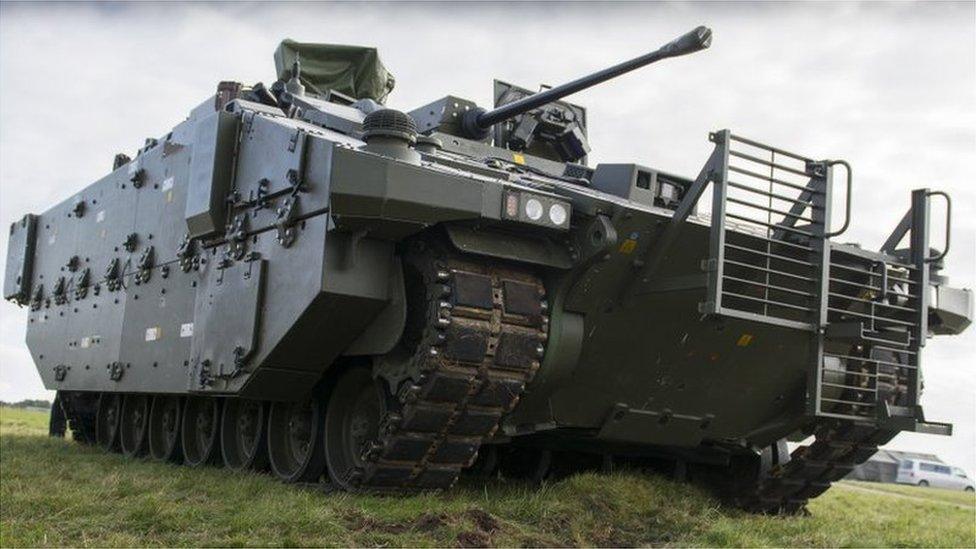Delays to Ajax armoured vehicles risk national security, MPs warn
- Published

So far just 26 Ajax vehicles of nearly 600 have been delivered, despite the project being years over schedule
The government must either scrap or fix a troubled modern armoured vehicle programme - or risk compromising national security, a report has said.
A review of the Ajax project by the Public Accounts Committee (PAC) concluded a "litany of failures" had led to the years-long delays.
So far no operational vehicles have been delivered, despite the 12-year-old project already costing over £3bn.
The new reconnaissance vehicle was supposed to enter service in 2017.
The Ministry of Defence (MoD) said it agreed with many of the recommendations and was taking steps to address them.
It added that any further delays would not be paid for by the taxpayer, due to the fixed price contract of £5.5bn agreed with a US weapons manufacturer.
Built by General Dynamics, the Ajax armoured vehicles are supposed to provide the army with the latest cutting edge digital battlefield technology.
Since the contract was signed in 2014, the project has delivered 26 reconnaissance vehicles out of a promised 589 vehicles - which can only be used for training.
The PAC report expressed scepticism that the Ajax programme could be delivered within existing contract arrangements.
The committee said delays had forced the military to make "operational compromises" like prolonging deployment of the Warrior armoured vehicle, which was first used in 1987.
It argues that the project has been poorly planned and managed, with major safety issues discovered during testing leading to the significant delays.
As of December 2021, more than 300 military personnel may have been harmed by excessive vibration and noise
'Directly threatening safety'
The PAC said management of the Ajax project had been "flawed from the outset" and the MoD had "once again made fundamental mistakes" in planning and managing a major military equipment programme.
The committee also warned that the department still did not know when Ajax would enter service or if the noise and vibration problems could be solved - two years after first being raised.
However, the army has said it is "cautiously optimistic" that Ajax can enter service by 2030.
Committee chairwoman Dame Meg Hillier said the government "must fix or fail this programme, before more risk to our national security and more billions of taxpayers' money wasted".
"These repeated failures are putting strain on older capabilities which are overdue for replacement and are directly threatening the safety of our service people and their ability to protect the nation and meet Nato commitments," she added.
The report also cautioned that further delays would increase the chances of continuing to miss targets, urging ministers to examine alternatives to the General Dynamics contract if it fails.
A decision on whether to salvage or scrap the project entirely is expected by the end of the year.

The MoD said Defence Secretary Ben Wallace had been "clear that Ajax is a troubled programme" and their contract meant delays would not cost the taxpayer more.
A spokesperson said: "We agree with many of the committee's recommendations and are actively taking steps to correct these."
"General Dynamics have received no payments under the contract in 2021 and 2022. No further payments will be made until we are satisfied with the future trajectory of the programme."
The Ajax project employs 800 people across two sites at Merthyr Tydfil and Oakdale in south Wales, as well as supporting more than 4,000 jobs across the UK.
The National Audit Office has previously warned there was a risk that troubles with the project "might prove insurmountable".